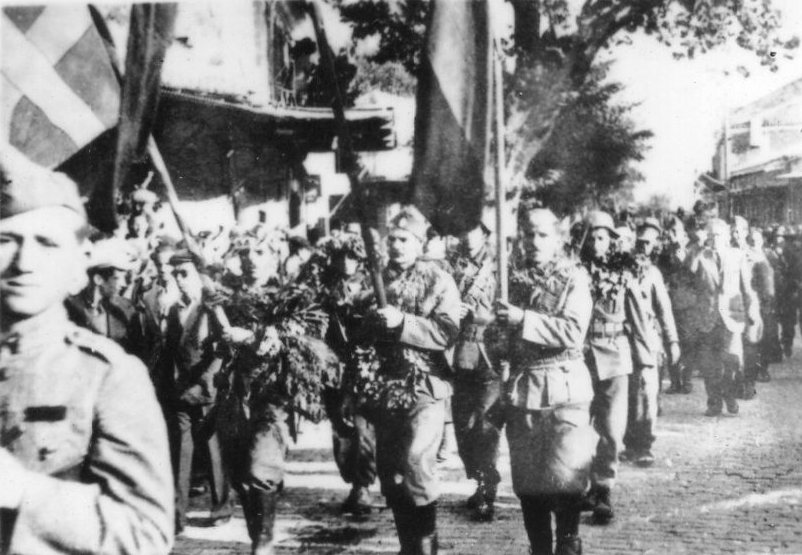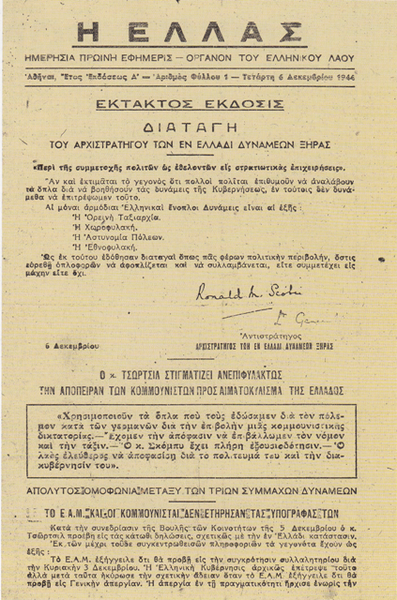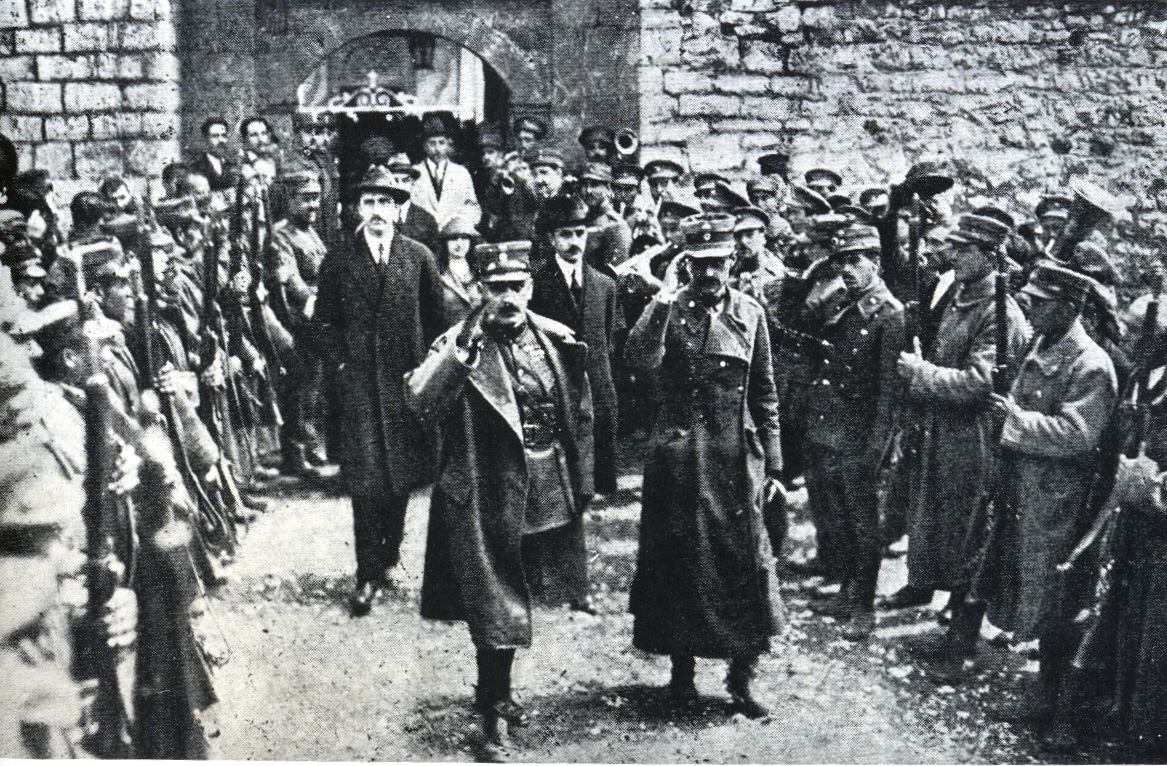|
Ethniko Apeleftherotiko Metopo
The National Liberation Front ( el, Εθνικό Απελευθερωτικό Μέτωπο, ''Ethnikó Apeleftherotikó Métopo'' (EAM) was an alliance of various political parties and organizations which fought to liberate Greece from Axis Occupation. It was the main movement of the Greek Resistance during the occupation of Greece. Its main driving force was the Communist Party of Greece (KKE), but its membership throughout the occupation included several other leftist and republican groups. ΕΑΜ became the first true mass social movement in modern Greek history. Its military wing, the Greek People's Liberation Army (ELAS), quickly grew into the largest armed guerrilla force in the country, and the only one with nationwide presence. At the same time, from late 1943 onwards, the political enmity between ΕΑΜ and rival resistance groups from the centre and right evolved into a virtual civil war, while its relationship with the British and the British-backed Greek governmen ... [...More Info...] [...Related Items...] OR: [Wikipedia] [Google] [Baidu] |
Greek Language
Greek ( el, label=Modern Greek, Ελληνικά, Elliniká, ; grc, Ἑλληνική, Hellēnikḗ) is an independent branch of the Indo-European family of languages, native to Greece, Cyprus, southern Italy (Calabria and Salento), southern Albania, and other regions of the Balkans, the Black Sea coast, Asia Minor, and the Eastern Mediterranean. It has the longest documented history of any Indo-European language, spanning at least 3,400 years of written records. Its writing system is the Greek alphabet, which has been used for approximately 2,800 years; previously, Greek was recorded in writing systems such as Linear B and the Cypriot syllabary. The alphabet arose from the Phoenician script and was in turn the basis of the Latin, Cyrillic, Armenian, Coptic, Gothic, and many other writing systems. The Greek language holds a very important place in the history of the Western world. Beginning with the epics of Homer, ancient Greek literature includes many works of lasting impo ... [...More Info...] [...Related Items...] OR: [Wikipedia] [Google] [Baidu] |
Battle Of Greece
The German invasion of Greece, also known as the Battle of Greece or Operation Marita ( de , Unternehmen Marita, links = no), was the attack of Greece by Italy and Germany during World War II. The Italian invasion in October 1940, which is usually known as the Greco-Italian War, was followed by the German invasion in April 1941. German landings on the island of Crete (May 1941) came after Allied forces had been defeated in mainland Greece. These battles were part of the greater Balkans Campaign of the Axis powers and their associates. Following the Italian invasion on 28 October 1940, Greece, with British air and material support, repelled the initial Italian attack and a counter-attack in March 1941. When the German invasion, known as Operation Marita, began on 6 April, the bulk of the Greek Army was on the Greek border with Albania Albania ( ; sq, Shqipëri or ), or , also or . officially the Republic of Albania ( sq, Republika e Shqipërisë), is a country in Sout ... [...More Info...] [...Related Items...] OR: [Wikipedia] [Google] [Baidu] |
Exile
Exile is primarily penal expulsion from one's native country, and secondarily expatriation or prolonged absence from one's homeland under either the compulsion of circumstance or the rigors of some high purpose. Usually persons and peoples suffer exile, but sometimes social entities like institutions (e.g. the papacy or a government) are forced from their homeland. In Roman law, ''exsilium'' denoted both voluntary exile and banishment as a capital punishment alternative to death. Deportation was forced exile, and entailed the lifelong loss of citizenship and property. Relegation was a milder form of deportation, which preserved the subject's citizenship and property. The term diaspora describes group exile, both voluntary and forced. "Government in exile" describes a government of a country that has relocated and argues its legitimacy from outside that country. Voluntary exile is often depicted as a form of protest by the person who claims it, to avoid persecution and prosecu ... [...More Info...] [...Related Items...] OR: [Wikipedia] [Google] [Baidu] |
4th Of August Regime
The 4th of August Regime ( el, Καθεστώς της 4ης Αυγούστου, Kathestós tis tetártis Avgoústou), commonly also known as the Metaxas regime (, ''Kathestós Metaxá''), was a totalitarian regime under the leadership of General Ioannis Metaxas that ruled the Kingdom of Greece from 1936 to 1941. On 4 August 1936, Metaxas, with the support of King George II, suspended the Greek parliament and went on to preside over a conservative, staunchly anti-communist government. The regime took inspiration in its symbolism and rhetoric from Fascist Italy, but retained close links to Britain and the French Third Republic, rather than the Axis powers. Lacking a popular base, after Metaxas' death in January 1941 the regime hinged entirely on the King. Although Greece was occupied following the German invasion of Greece in April 1941 and the Greek government was forced into exile in the British-controlled Kingdom of Egypt, several prominent figures of the regime, notably the ... [...More Info...] [...Related Items...] OR: [Wikipedia] [Google] [Baidu] |
Greek Civil War
The Greek Civil War ( el, ο Eμφύλιος [Πόλεμος], ''o Emfýlios'' [''Pólemos''], "the Civil War") took place from 1946 to 1949. It was mainly fought against the established Kingdom of Greece, which was supported by the United Kingdom and the United States and won in the end. The losing opposition held a self-proclaimed people's republic, the Provisional Democratic Government, Provisional Democratic Government of Greece, which was governed by the Communist Party of Greece (KKE) and its military branch, the Democratic Army of Greece (DSE). The rebels were supported by Socialist Federal Republic of Yugoslavia, Yugoslavia and the Soviet Union. The war has its roots at the WW2 conflict, between the Communist Party of Greece, communist-dominated left-wing Greek Resistance, resistance organisation, the National Liberation Front (Greece), EAM-ELAS, and loosely-allied anticommunist resistance forces. It later escalated into a major civil war between the state and the communist ... [...More Info...] [...Related Items...] OR: [Wikipedia] [Google] [Baidu] |
White Terror (Greece)
White Terror ( el, Λευκή Τρομοκρατία) is the term used in Greece, analogous to similar cases, for the period of persecution of members of the Communist Party of Greece (KKE) and other former members of the leftist World War II-era resistance organization National Liberation Front (EAM) in 1945–46, prior to the outbreak of the Greek Civil War. Background During the Axis occupation of Greece, the communist-dominated EAM-ELAS had become the major organization within the Greek Resistance movement. By the summer of 1944, with an estimated membership of between half and two million, and disposing of some 150,000 fighters, it dwarfed its nearest non-communist rivals, EDES and EKKA. Mounting tensions between itself and the other rival groups, sparked by ideology as well as EAM-ELAS' ambition to be the sole instrument of "national liberation", led to repeated clashes in 1943–44, in what was later termed the "first phase" of the Civil War. At the time of Greece's ... [...More Info...] [...Related Items...] OR: [Wikipedia] [Google] [Baidu] |
Dekemvriana
The ''Dekemvriana'' ( el, Δεκεμβριανά, "December events") refers to a series of clashes fought during World War II in Athens from 3 December 1944 to 11 January 1945. The conflict was the culmination of months of tension between the communist EAM, some parts of its military wing, the ELAS stationed in Athens, the KKE and the OPLA from one side and from the other side, the , some parts of the Hellenic Royal Army, the Hellenic Gendarmerie, the Cities Police, the far-right Organization X, among others and also the British Army. Regardless of the tensions between the left and the right, in May 1944 it had been roughly agreed in the Lebanon Conference that all non-collaborationist factions would participate in a Government of National Unity; eventually 6 out of 24 ministers were appointed by EAM. Additionally, a few weeks before the withdrawal of the German troops in October 1944, it had been reaffirmed in the Caserta Agreement that all collaborationist forces would b ... [...More Info...] [...Related Items...] OR: [Wikipedia] [Google] [Baidu] |
Georgios Papandreou
Georgios Papandreou ( ''Geórgios Papandréou''; 13 February 1888 – 1 November 1968) was a Greek politician, the founder of the Papandreou political dynasty. He served three terms as prime minister of Greece (1944–1945, 1963, 1964–1965). He was also deputy prime minister from 1950–1952, in the governments of Nikolaos Plastiras and Sofoklis Venizelos and served numerous times as a cabinet minister, starting in 1923, in a political career that spanned more than five decades. Early life Papandreou was born at Kalentzi, in the Achaea region of the northern Peloponnese. He was the son of Father Andreas Stavropoulos, an Orthodox archpriest (protopresvyteros). His last name is derived from his father's Christian name and the word ''papas'' "priest". He studied law in Athens and political science in Berlin. His political philosophy was heavily influenced by German social democracy. As a result, he was adamantly opposed to the monarchy and supported generous social policies, ... [...More Info...] [...Related Items...] OR: [Wikipedia] [Google] [Baidu] |
Lebanon Conference
The Lebanon conference ( el, Συνέδριο του Λιβάνου) was held on May 17–20, 1944, between representatives of the Greek government in exile, the pre-war Greek political parties, and the major Greek Resistance organizations, with the British ambassador Reginald Leeper in attendance. The conference occurred after an anti-monarchist mutiny among the Greek military the previous month. PM Georgios Papandreou's policy was to create a National Unity government ("National Contract") with the participation of the communist-dominated EAM. Finally there was a partial agreement, though tensions and disagreements remained. Delegates * Georgios Papandreou, Prime Minister of the Greek government in exile * Sofoklis Venizelos, , and of the Liberal Party * for the People's Party * for the National People's Party () * Georgios Sakalis for the Progressive Party * for the * Ioannis Sofianopoulos for the Union of the Left (Ένωση Αριστερών) * Panagiotis Kanellopo ... [...More Info...] [...Related Items...] OR: [Wikipedia] [Google] [Baidu] |
Political Committee Of National Liberation
The Political Committee of National Liberation ( el, Πολιτική Επιτροπή Εθνικής Απελευθέρωσης, ''Politiki Epitropi Ethnikis Apeleftherosis'', PEEA), commonly known as the "Mountain Government" ( el, Κυβέρνηση του Βουνού, ''Kivernisi tou Vounou''), was a Communist Party-dominated government established in Greece in 1944 in opposition to both the collaborationist German-controlled government at Athens and to the royal government-in-exile in Cairo. It was integrated with the Greek government-in-exile in a national unity government at the Lebanon conference in May 1944. Background Establishment The PEEA was established on 10 March 1944 by the leftist National Liberation Front (EAM)/Greek People's Liberation Army (ELAS) movement, which was then in control of much of the country. Its aims, according to its founding charter, were, "to intensify the struggle against the conquerors ... for full national liberation, for the co ... [...More Info...] [...Related Items...] OR: [Wikipedia] [Google] [Baidu] |
Greek Government In Exile
The Greek government-in-exile was formed in 1941, in the aftermath of the Battle of Greece and the subsequent occupation of Greece by Nazi Germany and Fascist Italy. The government-in-exile was based in Cairo, Egypt, and hence it is also referred to as the "Cairo Government" ( el, Κυβέρνηση του Καΐρου). It was the internationally recognised government during the years of the Axis occupation of Greece. It was headed by King George II, who evacuated Athens in April 1941 after the German invasion of the country, first to the island of Crete and then to Cairo. He remained there until the German occupying forces withdrew from the country on 17 October 1944. The British wielded a significant amount of influence over the government-in-exile. Until 1944 it was also recognized as the legal Greek government by all Greek Resistance forces. In the occupied Greece, alongside the Axis-controlled collaborationist governments, a vigorous resistance movement developed. Its m ... [...More Info...] [...Related Items...] OR: [Wikipedia] [Google] [Baidu] |





